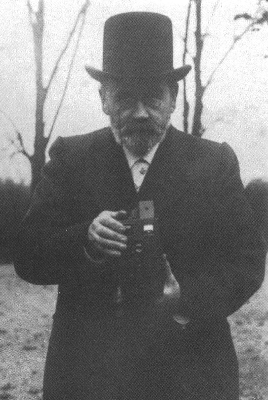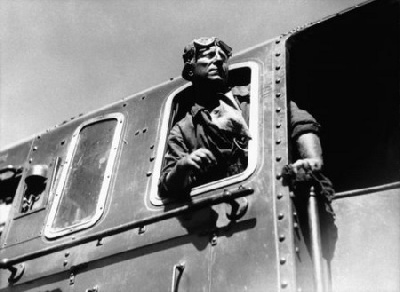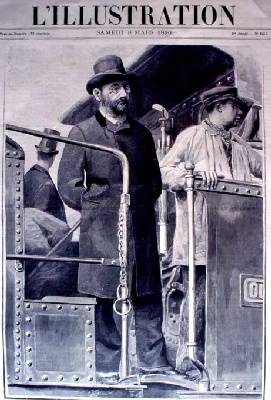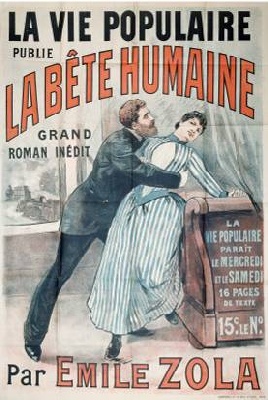Complete Works of Emile Zola (1032 page)
Read Complete Works of Emile Zola Online
Authors: Émile Zola

And while the priest, after the final prayers, exhorted them once more, Angelique wore always the sweet expression of renunciation; she, the pure soul, who knew the truth.
Then, as the Abbe Cornille withdrew, accompanied by his clerks, the organs again burst forth with peals of joy. Monseigneur, motionless until now, bent towards the young couple with an expression of great mildness in his eagle-like eyes. Still on their knees, the Huberts lifted their heads, blinded by their tears of joy. And the enormous depths of the organs’ peals rolled and lost themselves by degrees in a hail of little sharp notes, which were swept away under the high arches, like the morning song of the lark. There was a long waving movement, a half-hushed sound amongst the reverential crowd, who filled to overflowing even the side-aisles and the nave. The church, decorated with flowers, glittering with the taper lights, seemed beaming with joy from the Sacrament.
Then there were nearly two hours more of solemn pomp; the Mass being sung and the incense being burnt.
The officiating clergyman had appeared, dressed in his white chasuble, accompanied by the director of the ceremonies, two censer-bearers carrying the censer and the vase of incense, and two acolytes bearing the great golden candlesticks, in which were lighted tapers.
The presence of Monseigneur complicated the rites, the salutations, and the kisses. Every moment there were bowings, or bendings of the knee, which kept the wings of the surplices in constant motion. In the old stalls, with their backs of carved wood, the whole chapter of canons rose; and then again, at other times it was as if a breath from heaven prostrated at once the clergy, by whom the whole apse was filled. The officiating priest chanted at the altar. When he had finished, he went to one side, and took his seat while the choir in its turn for a long time continued the solemn phrases of the services in the fine, clear notes of the young choristers, light and delicate as the flutes of archangels. Among these voices was a very beautiful one, unusually pure and crystalline, that of a young girl, and most delicious to hear. It was said to be that of Mademoiselle Claire de Voincourt, who had wished and obtained permission to sing at this marriage, which had been so wonderfully secured by a miracle. The organ which accompanied her appeared to sigh in a softened manner, with the peaceful calm of a soul at ease and perfectly happy.
There were occasionally short spells of silence. Then the music burst out again with formidable rollings, while the master of the ceremonies summoned the acolytes with their chandeliers, and conducted the censer-bearers to the officiating clergyman, who blessed the incenses in the vases. Now there was constantly heard the movements of the censer, with the silvery sound of the little chains as they swung back and forth in the clear light. There was in the air a bluish, sweet-scented cloud, as they incensed the Bishop, the clergy, the altar, the Gospel, each person and each thing in its turn, even the close crowd of people, making the three movements, to the right, to the left, and in front, to mark the Cross.
In the meantime Angelique and Felicien, on their knees, listened devoutly to the Mass, which is significant of the mysterious consummation of the marriage of Jesus and the Church. There had been given into the hands of each a lighted candle, symbol of the purity preserved since their baptism. After the Lord’s Prayer they had remained under the veil, which is a sign of submission, of bashfulness, and of modesty; and during this time the priest, standing at the right-hand side of the altar, read the prescribed prayers. They still held the lighted tapers, which serve also as a sign of remembrance of death, even in the joy of a happy marriage. And now it was finished, the offering was made, the officiating clergyman went away, accompanied by the director of the ceremonies, the incense-bearers, and the acolytes, after having prayed God to bless the newly-wedded couple, in order that they might live to see and multiply their children, even to the third and fourth generation.
At this moment the entire Cathedral seemed living and exulting with joy. The March Triumphal was being played upon the organs with such thunder-like peals that they made the old edifice fairly tremble. The entire crowd of people now rose, quite excited, and straining themselves to see everything; women even mounted on the chairs, and there were closely-pressed rows of heads as far back as the dark chapels of the outer side-aisles. In this vast multitude every face was smiling, every heart beat with sympathetic joy. In this final adieu the thousands of tapers appeared to burn still higher, stretching out their flames like tongues of fire, vacillating under the vaulted arches. A last Hosanna from the clergy rose up through the flowers and the verdure in the midst of the luxury of the ornaments and the sacred vessels. But suddenly the great portal under the organs was opened wide, and the sombre walls of the church were marked as if by great sheets of daylight. It was the clear April morning, the living sun of the spring-tide, the Place du Cloitre, which was now seen with its tidy-looking, white houses; and there another crowd, still more numerous, awaited the coming of the bride and bridegroom, with a more impatient eagerness, which already showed itself by gestures and acclamations. The candles had grown paler, and the noises of the street were drowned in the music of the organs.
With a slow step, between the double hedge of the worshippers, Angelique and Felicien turned towards the entrance-door. After the triumphant carrying out of her dream, she was now about to enter into the reality of life. This porch of broad sunlight opened into the world of which as yet she was entirely ignorant. She retarded her steps as she looked earnestly at the rows of houses, at the tumultuous crowd, at all which greeted and acclaimed her. Her weakness was so intense that her husband was obliged to almost carry her. However, she was still able to look pleased, as she thought of the princely house, filled with jewels and with queenly toilettes, where the nuptial chamber awaited her, all decorated with white silk and lace. Almost suffocated, she was obliged to stop when halfway down the aisle; then she had sufficient strength to take a few steps more. She glanced at her wedding ring, so recently placed upon her finger, and smiled at this sign of eternal union. Then, on the threshold of the great door, at the top of the steps which went down into the Place du Cloitre, she tottered. Had she not really arrived at the summit of her happiness? Was not it there that the joy of her life, being perfected, was to end? With a last effort she raised herself as much as possible, that she might put her lips upon the lips of Felicien. And in that kiss of love she passed away for ever.
But her death was without sadness. Monseigneur, with his habitual movement of pastoral benediction, aided this pure soul to free itself from the frail body. He had regained his calmness, and had once more found in the fulfillment of his sacred calling the desired-for peace.
The Huberts, unconscious of what had taken place, were still kneeling, grateful for the pardon at last granted them, and feeling as if re-entering into existence. For them, as well as for their beloved daughter, the dream was accomplished. All the Cathedral and the whole town were
en fete
. The organs sounded louder than ever; the bells pealed joyously; the multitude waited to greet the loving couple on the threshold of the mystic church under the glorious spring sunlight.
It was indeed a beautiful death. Angelique, happy and pure, carried away suddenly at the moment of the realisation of her fondest dream, taken into the heavenly life from the dark Romanesque chapels with the flamboyant, Gothic-vaulted ceiling, from among the gilded decorations and paintings of ancient times, in the full Paradise of Golden Legends. What more could she have asked for?
Felicien held in his arms simply a soft and tender form, from which life had departed; this bridal robe of lace and pearls seemed like the light wings of a bird, still warm to the touch. For a long time he had well known that he could claim but a shadow. The exquisite vision that came from the Invisible had returned to the Invisible.
It was merely a semblance, which effaced itself; the vanishing of an illusion.
Everything is only a dream.
And so, at the moment of supreme earthly happiness, Angelique had disappeared in the slight breath of a loving kiss.
THE END
THE HUMAN BEAST

Translated by Ernest Alfred Vizetelly
First appearing in 1890,
La Bête humaine
is a tense, psychological thriller concerning the railway between Paris and Le Havre. The main characters of the novel are Roubaud, the deputy station master at Le Havre, his wife Séverine and Jacques Lantier, an engine driver on the line, serving as the family link with the rest of
Les Rougon-Macquart
novel cycle. Lantier is the son of Gervaise, from the earlier work
L’Assommoir
, and the brother of both Étienne Lantier from
Germinal
and Claude Lantier in
L’Œuvre
.
Lantier, the “human beast” referred to in the title, suffers from a hereditary madness, urging him at times to murder women. At the beginning of the story he is a train driver, in control of his engine “La Lison” – a relationship that is almost portrayed as being sexual, providing a form of control over his mania. Meanwhile, as a result of a chance remark, Roubaud suspects that his wife has had an affair some years earlier with Grandmorin, one of the directors of the railway company, who had acted as her patron and who had helped Roubaud attain his position.

Zola, close to the time of publication. The author was an avid photographer, building a large collection of cameras.

Jacques Lantier portrayed on the screen by Jean Gabin

Cover of the magazine L’Illustration showing the research Zola performed by rail for the novel, 1890

